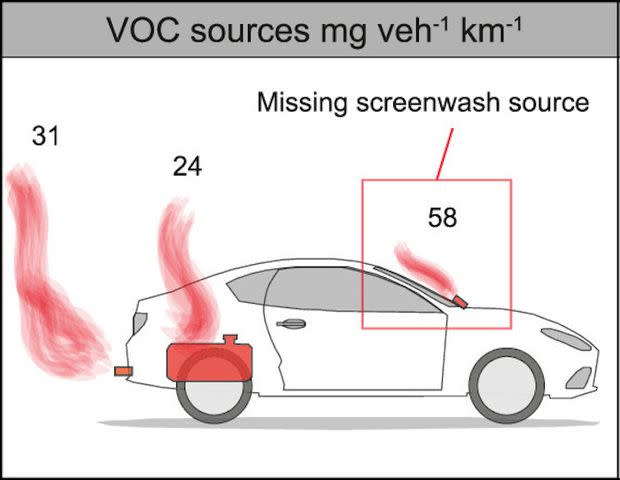Windshield Washer Fluid Has a Dirty Little Secret
Researchers find windshield washer fluid is a surprisingly significant source of vehicle-related pollution.

Oh, cars.
It's no secret that automobiles are a tremendous source of air pollution, contributing to five classes of major air pollutants—nitrogen oxides, particulate matter (PM), ozone, volatile organic compounds (VOCs), and carbon monoxide.
Fortunately, there have been large decreases in both emissions and some concentrations of VOCs since the mid-1990s in Europe and North America, thanks to increasingly stringent emissions legislation and air pollution abatement strategies. Given the transition to electrification, there has also been increased research around nonexhaust PM—think, brake and tire wear—since these sources aren't going anywhere with electric cars. Yet there's one thing that hasn't been studied closely: nonexhaust VOC emissions.
But now, a new study looks at the topic, and the results are surprising. The study authors report that alcohols in windshield washer fluid "account for a larger fraction of real-world vehicle emissions than previous estimates have suggested." In fact, they found that the release of two alcohols (ethanol and methanol) was nearly two times the amount of all VOCs released in exhaust.
What Are VOCs?
Volatile organic compounds (VOCs) are a broad classification of carbon-based molecules that are easily vaporized, and that can contribute to ozone formation. For more, see What Are Volatile Organic Compounds (VOCs) and How to Avoid Them.
Prior to the study, which was published in Environmental Science & Technology, a national inventory in the United Kingdom estimated that car-care products like windshield fluid could be an even greater source of VOCs than exhaust, but there hadn't been the science to back it up. So, Samuel J. Cliff, from the University of York, UK, and coworkers "decided to measure the amounts of vaporized windshield washer fluid ingredients from cars on a real-world road and compare it to the inventory estimates," explains a press release for the study.

Samuel J. Cliff et al
They found that these products are a "significant, if unexpected," source of pollutants emitted by automobiles. The researchers note that this should come into play in future regulatory policy, particularly as drivers switch to electric vehicles, which will, of course, still require clean windshields.
The Windshield Phenomenon
We can't talk about dirty windshields without mentioning how much cleaner they are nowadays, thanks to the alarming decline in insect populations. Dubbed the "windshield phenomenon," the term gained traction in 2017 following the publication of a study about disappearing insect populations. The study was inspired by anecdotal evidence of people finding fewer dead bugs on their windshields. Now we know that the rate of extinction for insects is eight times faster than that of mammals, birds, and reptiles. At the rate insects are declining, they could vanish within a century.
"An important feature of car care product emissions is that they are independent of fuel type, meaning the emissions are applicable to all vehicles including those powered by battery electric powertrains," the study authors write. "Therefore, we use this information to propose the need for a direct VOC emission factor for electric vehicles in international methodologies that are used to quantify the impacts of road transport on air quality."
In the end, it's just more evidence that electric cars on their own won't save the planet and certainly won't save us from automobile-generated pollution. We will still have the issue of the PM emissions from tire, brake, clutch, and road wear, as well as the resuspension of road dust, stirring up all the PM that settled on the road previously. Now, add in the VOCs spraying out of our windshields. While electric cars are better than their gas-fuelled predecessors, it's important to remember that electric cars are still cars, and finding ways to reduce our reliance on them would go a long way toward preserving a more liveable environment.
Read Next: Are Electric Cars Truly Better for the Environment?

